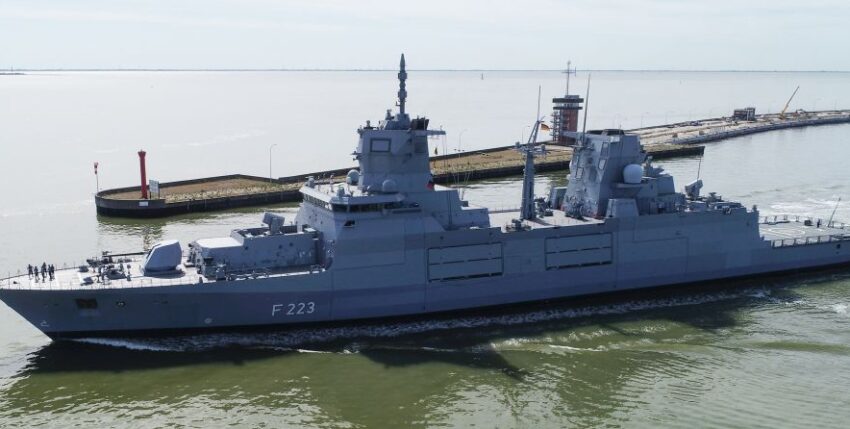The situation at Germany's most modern deep-water port, the Jade-Weser-Port in Wilhelmshaven, is portrayed as dramatically bad. In 2013, 76,265 containers are said to have been handled in the port, which is only around 101TP3 tonnes of what port operators and economic forecasts had expected.
The daily newspaper Die Welt writes about this:
In the past year, the Jade-Weser Port 76,265 standard containers handled. The seaport is designed to handle 2.7 million containers a year - in the first expansion stage.
This figure was announced by port operator Eurogate, the largest company of its kind in Europe. The announcement almost seems baffling: Eurogate has increased its total container handling to 14.2 million TEU (Twenty Foot Equivalent Units). Spread across eleven locations in Europe, this is an increase of a good seven per cent.
In Tangier in Morocco, for example, this figure doubled to around one million containers, and there was also strong growth for Eurogate in Gioia Tauro in Italy and Cagliari in Sardinia. Even in the port of Hamburg, where the environment was difficult, the increase was almost eight per cent.
The short-term regulation expires in spring
But things are in the doldrums in Wilhelmshaven: in 2013, just eleven per cent of the 700,000 containers previously promised by Eurogate to the clients in the first full year of operation were handled. Europe's largest container handling company has to offset losses in the double-digit millions from Wilhelmshaven with profits at other locations."The container terminal in the deep-water port, which opened at the end of 2012, needs more time than originally expected to establish itself in the market," writes Eurogate in a thinly-veiled press release. The principle of hope applies. Eurogate has invested around 400 million euros in the port facilities and the management has been endeavouring to attract the world's major shipping companies to Wilhelmshaven for two years now.
The comparatively expensive harbour fees and conditions for shipping companies, which are set by the builders, the states of Lower Saxony and Bremen, are repeatedly criticised. However, the global 6 February 2014 shipping crisis, in which there is an oversupply of container ships and falling demand for transport from trade and industry, is also a cause of the misery.
Pathetic balance sheet for German mega port, in: Die Welt 6 February 2014
The problem is not even that the announced figures will not be achieved, but the glaring disproportion between the planned and actual container handling figures. The operator Eurogate will Jade-Weser Port After all, we didn't plan and design the site the way it was realised just for fun. In fact, the Fraunhofer Centre for Maritime Logistics certified that the Wilhelmshaven site had the best conditions and significant growth opportunities back in 2013.
So what's the problem?
We are certainly no economic sages, but the mixture of high port charges, infrastructure backlog in the hinterland and a lack of overarching conception at least among the German ports is what is making itself felt here. The JWP realisation company is responsible for the port charges (shares: State of Lower Saxony 50.1 %, State of Bremen 49.9 %), and from their point of view the relatively high port charges seem to make sense: the charges are designed in such a way that it is hardly worthwhile for small and normal ships to unload containers in the JWP, but are attractive for the new generation of mega container ships, for which the JWP is also designed. This is probably intended to prevent the ports of Bremen and Hamburg in particular from losing share in the "normal" container ship segment. According to Eurogate, however, this was agreed differently.
As described in the article, the operator Eurogate is proving with its other port locations that growth is possible in the container industry despite the shipping crisis and infrastructure requirements. All hopes are now pinned on the new generation of mega container ships, which can hold up to 18,000 standard containers. As they are too large and deep for most ports in Northern Europe, the Jade-Weser Port As one of the few deep-water harbours in this region, the port does indeed have a locational advantage. Around one hundred of these container ships are due to enter service in the coming months and will serve global routes.











7 responses
The end of the trough now appears to be in sight: http://wahl.radiobremen.de/politik/nachrichten/eurogate-liniendienste102.html
Although the company is far from being fully utilised with three lines, the trend speaks for itself, says
the sailor
I would also like to point out that people in Hamburg are beginning to rethink: http://www.wzonline.de/index.php?id=621&tx_ttnews%5Btt_news%5D=269041&cHash=ed27620fcb14f6abad0db411f6648995
Perhaps people will finally realise that we can only work together and not against each other,
hopes
the sailor
The P-3 alliance has failed: http://www.wzonline.de/nachrichten/hafen-marine/nachrichten-von-der-marine-und-dem-jadeweserport-aus-wilhelmshaven/artikel/china-verhindert-p3-allianz.html. And what happens now,
asks
the sailor
Thanks for the tip - we'll have a comment on this soon!
Moreover, optimism is being spread with regard to the planned P 3 container alliance of the world's three largest shipping companies, which also includes Maersk (http://www.welt.de/wirtschaft/article117240425/Container-Riesen-schliessen-weltweites-Buendnis.html). If their formal co-operation for the deployment of their very large ships is approved by the cartel authorities in the next few weeks (?), Wilhelmshaven will receive additional lines. So let's wait and see,
thinks
the sailor
The example of the Jade-Weser Port shows the short-sighted parochial thinking of regional political leaders. Globalised supply chains take no account of this! The Jade-Weser Port shows that a national harbour strategy - embedded in European coordination with Rotterdam and Antwerp - is needed. Let's hope that the German government's new Maritime Coordinator is more than just a politician from the coast, says Fleet.
We have already discussed the harbour concept several times in this blog. And we still have a Bavarian transport minister. Let's hope that the new Maritime Coordinator of the Federal Government from Bremen will have a positive impact. However, he sits in a different ministry and belongs to a different party. Let's see if the Minister of Economic Affairs tries to make a name for himself here.
That could help,
thinks
the sailor